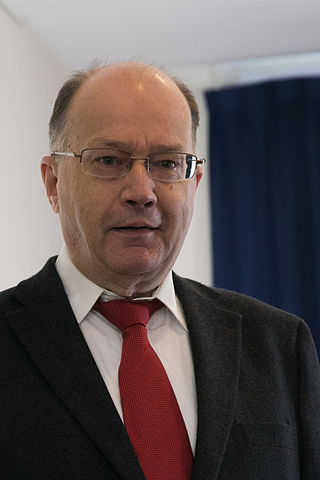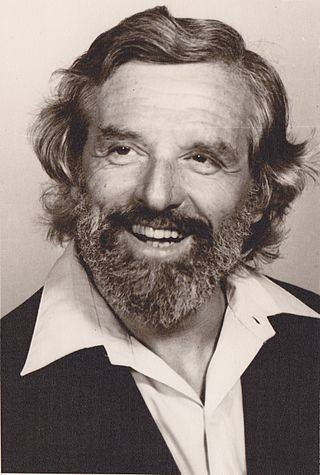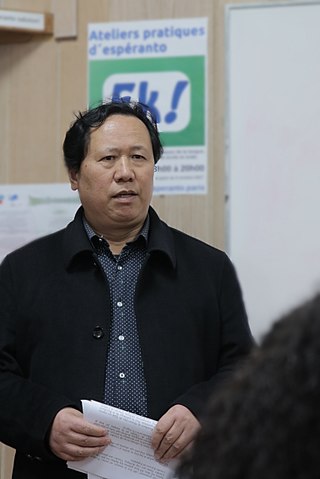
Esperanto is the world's most widely spoken constructed international auxiliary language. Created by the Warsaw-based ophthalmologist L. L. Zamenhof in 1887, it is intended to be a universal second language for international communication, or "the international language". Zamenhof first described the language in Dr. Esperanto's International Language, which he published under the pseudonym Doktoro Esperanto. Early adopters of the language liked the name Esperanto and soon used it to describe his language. The word esperanto translates into English as "one who hopes".

Esperantujo or Esperantio is the community of speakers of the Esperanto language and their culture, as well as the places and institutions where the language is used. The term is used "as if it were a country."

L. L. Zamenhof developed Esperanto in the 1870s and '80s. Unua Libro, the first print discussion of the language, appeared in 1887. The number of Esperanto speakers have increased gradually since then, without much support from governments and international organizations. Its use has, in some instances, been outlawed or otherwise suppressed.
Esperanto culture refers to the shared cultural experience of the Esperantujo, or Esperanto-speaking community. Despite being a constructed language, Esperanto has a history dating back to the late 19th century, and shared socio-cultural norms have developed among its speakers. Some of these can be traced back to the initial ideas of the language's creator, Ludwig Zamenhof, including the theory that a global second language would foster international communication. Others have developed over time, as the language has allowed different national and linguistic cultures to blend together. Some Esperanto speakers have also researched the language's ideologies.

Esperanto symbols, primarily the Esperanto flag, have seen much consistency over the time of Esperanto's existence, though a few variations in exact flag patterning and symbology exist.

The Akademio de Esperanto is an independent body of Esperanto speakers who steward the evolution of said language by keeping it consistent with the Fundamento de Esperanto in accordance with the Declaration of Boulogne. Modeled somewhat after the Académie française and the Real Academia Española, the Akademio was proposed by L. L. Zamenhof, the creator of Esperanto, at the first World Esperanto Congress, and was founded soon thereafter under the name Lingva Komitato. This Committee had a "superior commission" called the Akademio. In 1948, within the framework of a general reorganization, the Language Committee and the Academy combined to form the Akademio de Esperanto.
The International Union of Catholic Esperantists is an organization of Catholic Esperanto speakers. It was founded in 1910 in Paris and is now headquartered in Rome.

Tullio De Mauro was an Italian linguist and politician. De Mauro was Professor Emeritus of General Linguistics at the Sapienza University of Rome, and held the post of Italian Minister of Education from 2000 to 2001.
Vladimír von Szmurlo was a Russian Esperantist and railway engineer.

Osmo Buller is a Finnish Esperantist is the General Director of the Universal Esperanto Association.
Like natural languages, the constructed language Esperanto contains profane words and indecent vocabulary. Some of this was formulated out of the established core vocabulary, or by giving specific profane or indecent senses to regularly formed Esperanto words. Other instances represent informal neologisms that remain technically outside the defined vocabulary of the language, but have become established by usage.

Anna Löwenstein is a British Esperantist. She worked for the World Esperanto Association 1977–1981. Under the name Anna Brennan she founded and was editor of the feminist magazine Sekso kaj Egaleco 1979–1988, and she edited the 'easy language' section of Kontakto 1983–1986. She has written some non-fiction, and two novels. Her historical novel The Stone City, was first published in English and Esperanto in 1999, and has since been translated into French (2010) and Hungarian (2014). Her second novel Morto de artisto (2008) was published in Esperanto. She is well known as a journalist, teacher and activist in the Esperanto movement, and has been a member of the Academy of Esperanto since 2001.

Heinz Bernhard Löwenstein, known as Heinz Bernard was a British actor and director and theatre manager. Of Polish-Jewish and German-Jewish descent, he lived and worked in Israel from 1971-81. He trained at the Royal Academy of Dramatic Arts (RADA), graduating in 1951.

The Esperantist of the Year is an honorary designation bestowed each year by the editors of the Esperanto-language monthly La Ondo de Esperanto. The award recipient is selected by an international jury led by Halina Gorecka, the Russian publisher of the magazine.

The World Esperantist Vegetarian Association is a voluntary association of Esperanto-speaking vegetarians. Founded in 1908, the group's working language is Esperanto, and it is the oldest international organization of vegetarians that is currently active. TEVA published a journal, Vegetarano ("Vegetarian") from 1914 to 1932, revived in 2009 as Esperantista Vegetarano, and has also operated a spirited Internet mailing list through Yahoo! Groups since 2005.

Peter Baláž, in Esperanto known as Petro, is an Esperantist, publisher and editor; he was selected as the 2012 Esperantist of the Year. Baláž lives in his hometown of Partizánske and speaks Slovak, Czech, German, Polish, Russian and English, as well as the international constructed language Esperanto.

The following outline is provided as an overview of and topical guide to Esperanto:

Esperanto was variously endorsed and oppressed in the Soviet Union throughout its history. The language was permitted by the government in the 1920s, but its internationalist nature brought it under scrutiny in the 1930s and Joseph Stalin enforced measures against the Esperanto community, having Esperanto speakers imprisoned and killed as part of the Great Purge. The Esperanto community was restored in the Soviet Union following the death of Joseph Stalin in 1953, but it did not achieve its earlier prominence.













